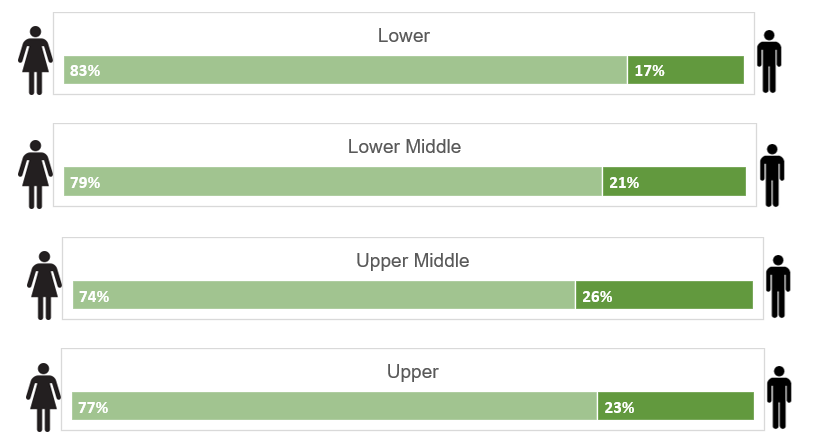April 2022 – March 2023 Published April 2024
Throughout the Maria Mallaband Care Group we are committed to offering high quality residential care, nursing homes and support services to older and vulnerable people in our communities. We could not achieve this without the dedication and hard work of our colleagues and team members. In light of this, we strive to provide a positive working environment wherein gender equality is encouraged and supported.
This statement has been published in accordance with the Equality Act 2010 (Gender Pay Gap Information) Regulations 2017, pursuant to which MMCG (2) Limited is required to publish a report on the gender pay gap within the organisation. The gender pay gap report indicates the difference in average hourly earnings for men and women. The calculations are based on employer payroll data from a specific date each year, being 5 April 2023.
Gender Pay and Bonus Gap
| Mean | Median | |
| Pay Gap | 0.6% | 3% |
| Bonus Gap | -99.9% | -240% |
When comparing the average hourly rate of pay, there is only a very small difference in the mean and median average pay of our male and female employees. The mean and median pay gaps show a slightly higher pay for male employees, whereas last year, it showed a slightly higher pay for female employees which shows that the statistics fluctuate and are subject to various factors. Within the company, more than 10% of our workforce comprises bank workers who play a fundamental part is providing continuity of care and flexibility to our workforce. Of these bank workers, ¾ are female (which is often the case as it provides flexibility around family care arrangements). While many of our senior roles within the company are held by women, the majority of our lower paid roles, such as caring and administrative roles are occupied by women.
The proportion of male employees receiving a bonus is 3.11% and the proportion of female employees receiving a bonus is 2.87%. 30 bonuses were paid in the year and these bonuses are earned and calculated based on KPIs set by role, making them fair and transparent. At first glance, the bonus gap figures appear to show an unusual differential, however the majority of the highest bonuses were paid to Home Managers, of which there are two male and eight female Home Managers which explains the reason for this large gap.
Of the bonuses paid during the reporting period, some of the highest bonuses were paid to Home and Deputy Managers. At the relevant time, two of these eleven roles were occupied by male employees which explains the gender bonus gap figures.
The proportion of male and female employees across all quartiles of our workforce is relatively evenly split with:

This statement explains why there is a gender pay gap within our organisation and what we are doing to reduce this gap.
Why we have a gender pay gap
Our workforce consists of 78% women and 22% men. This has changed little from the previous year and; as is commonplace within our industry, the majority of our workforce is female. Care giving roles are primarily undertaken by women throughout the industry and the organisation which generally attract lower rates of remuneration. As explained above, it is also the case that as an organisation we employ bank workers who work ad hoc shifts and irregular hours and are routinely women. Notwithstanding this, the majority of our management positions are occupied by women.
Our pay structure is banded according to role only, not gender, meaning that pay differentiation only occurs as a result of an employee's position. Similarly, bonus pay is determined by position and performance, not by gender. All remuneration rates within the Group are competitive and in line with market practices. Accordingly, we are satisfied that our existing pay structure and/or rewards policy are compliant with the Equality Act. We do, however, acknowledge the desire to recruit more men into care giving roles, to provide the opportunity for internal progression for all employees and to increase the number of men holding management level roles within the organisation.
Though not yet at the level to which we aspire, our organisation does have a mix of genders in roles of all types. Our commitment to improving this balance is shown by the increase in male employees entering the organisation in care giving roles over the last couple of years.
How we intend to continue to address the gender pay gap
In order to address the inherent imbalance within our sector we have implemented/intend to implement the following policies:
- Recruitment –
- We are committed to recruiting based solely on merit and not gender. Consequently, we continually review the way in which we describe/advertise our job vacancies and source our candidates; ensuring that all vacancies are presented in a gender neutral way.
- We encourage internal progression and support those candidates through industry relevant qualifications and seeking internal promotion opportunities.
- Programmes and workshops –
- We want to ensure that all those in care giving and middle management positions are aware of the opportunities available to them and are able to develop the skills required to attain leadership positions.
- We are committed to educating our managers and leaders about gender imbalances and unconscious bias.
- Remuneration –
- We continue to monitor the remuneration rates offered by the organisation to ensure that pay is banded solely according to role and not gender.
We anticipate that MMCG (2) Limited's continued commitment to this cause will be reflected in the gradual reduction of our gender pay and bonus gap over the coming years.
Our gender pay gap figures have been calculated in line with the gender pay gap reporting legislation. I confirm that these figures have been verified and are accurate.
Farouk Mangera
Group People Director
3 April 2024


